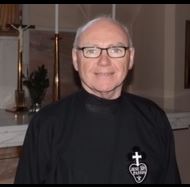There have been lots of recent campaigns encouraging people to donate blood and, as I write, Brother Antony and I are getting ready to celebrate our final Mass of the year at Glasgow Caledonian University, after which he hopes to dander down to Nelson Mandela Place and give blood for the 19th time, according to the form he received, although he had thought it was more. I, myself, used to regularly donate blood, but all that came to a halt back in 1985.
I was based in St. Mungo’s at the time, not too long after my ordination, and I had been invited by the Passionist Contemplative Nuns in Daventry, 80 miles northwest of London, to come down and give them an Advent Retreat. I was very happy to do this and looked forward to it as, at that time, there were a number of young nuns in the community who had joined through a Passion Prayer group that Father Paul Francis and I used to hold in St. Mungo’s, which was in fact a development from the Jesus Evening prayer group that Father Terence, my predecessor as Vocations Director, used to run.
The Passionist Nuns in Daventry tried to be self-sufficient in different ways, including bookbinding and carpentry but, more controversially, they kept battery hens and sold the eggs. They were always being “visited” by animal rights groups and, in time, they abandoned this occupation and took up the more acceptable, but not as lucrative occupation, of making Belgian chocolates instead – two of the nuns were Belgian and had a secret recipe. The ethics of keeping hens in battery cages was settled when an EU ban came into force some years ago, although I believe the practice still goes on, but this was well before that. The nuns kept two huts with roughly 10,000 egg-laying hens in each hut, and while I was there conducting the retreat one of the huts was being cleared and cleaned out to make way for a new batch of hens. A distinctive and unpleasant smell hung in the air that I felt I was breathing in the whole time. The retreat finished and, much as I had enjoyed it, and the nuns treated me very well, I was glad to get back to Glasgow and to St. Mungo’s for Christmas.
Very soon after my return I began to get carbuncles appearing on various parts of my body, most especially under my armpits and on the back of my neck. No sooner would one clear up than another would appear, and I felt totally drained, and permanently exhausted. Medication didn’t seem to help and eventually I was admitted to the Royal Infirmary to get a carbuncle removed from the back of my neck, and for a swab to be taken for analysis. The legendary Father Ambrose was chaplain at the time and I remember him giving me the Sacrament of the Sick the night before surgery. I went down to theatre next morning and the next thing I remember was waking up out of the anaesthetic with a lovely floating and peaceful feeling, and the realisation that it was all over. It was the weekend, and so I was let home to the Retreat and ordered to rest. The Rector kindly allowed a television to be put into my room and I remember on the Sunday night, 28th April 1985, lying awake watching Dennis Taylor beat Steve Davis on a re-potted black in the last of 35 frames, in an extraordinary and famous World Snooker Championship Final from the Crucible in Sheffield, which at 14 hours and 50 minutes, over two days, remains the longest final ever played. I watched it all from my bed.
The swab revealed a blood infection that was treatable by applying a tincture deep into my nostrils when I would feel my nose starting to swell, which apparently was the source, and the first sign of a carbuncle on the way. After a while the whole thing cleared up and, thankfully, it hasn’t returned since, but I was never allowed to donate blood after that. Now, I may be doing those poor hens a terrible disservice, but I have always considered them to be the cause of my lengthy, painful ailment, and of bringing to an end my blood-donor days.
The log will take a wee break now for the next few weeks, so let me wish you all a very happy and holy Christmas, with every blessing for the coming year.

 RSS Feed
RSS Feed
